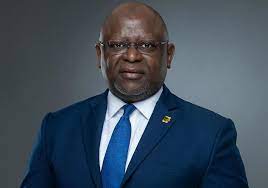Business
IT’S FIRSTBANK’S FINEST HOUR

IT’S FIRSTBANK’S FINEST HOUR
Dazzles stakeholders with growth across key metrics
Rising from a lower profit margin of N10.2billion and a debilitating Non-Performing Loan portfolio of 45 per cent in 2015, to an impressive profit of N147billion and a significantly lowered NPL rate of 5.6 per cent in 2022, FirstBank has proven that its back-to-back profit-making is far beyond recoveries made, but rather it’s a reinforcement of a well-articulated growth trajectory driven by a committed, competent and experienced Board and management team, writes Festus Akanbi
There seems to be a consensus among watchers of the Nigerian banking sector that these days, the changing dynamics foisted on the nation’s economy by both the current local and international economic realities are already taking their toll on Nigerian banks.
As the nation’s population rises, so also the need for banking services by the people. However, the rise in population and the corresponding rise in the number of unbanked and underbanked Nigerians are creating a new dimension of competition among banks in the country.
Therefore, as competition for the sphere of influence becomes fierce, analysts said only banks with a track record of consistent preparation for emerging challenges will stand the test of time, especially in a period of regime change with its attendant restructuring in the Nigerian economic policies.
FirstBank Returns with Solid Fundamentals
Top on the list of banks in this category is FirstBank Limited, a subsidiary of FBN Holdings Plc. This is because, from whatever angle one looks at its performance trajectory, especially in the last seven years, what is constant is the sustained growth in its deliveries coupled with its stabilization and return to the top of the ladder of the Nigerian banking industry.
The bank has over the years taken some far-reaching decisions, which observers said have created a new benchmark in the Nigerian banking industry, especially with its triumphant return to solid profitability within a period of seven years.
For example, in its full-year results for 2022, the bank was been able to record tremendous improvements in all performance metrics surveyed by our correspondent. It grew the number of total customer accounts from 10 million in 2015 to 41 million customer accounts as of December 2022. Its total number of issued cards rose from seven million in 2015 to 12 million last year.
Also within a spate of seven years, the number of its FirstMobile users rose to 6.1 million, while the number of FirstOnline users was put at 1.1 million in 2022. Its USSD users were said to have hit 14.7 million while the number of its total digital banking customers rose from 600,000 in 2015 to 22 million in 2022.
Agent Banking
In the same category is the bank’s agent banking business where FirstMonie agent banking is reaching out to customers in unbanked or underbanked regions to process financial requests through registered agents. This was non-existent in 2015, but by 2022, the bank could boast of 200,000 direct agents in all the crannies of the country. Analysts are quick to remind us that if we factor in the fact that most of the agent bankers usually employ about two additional staff, what it means is that FirstBank has empowered about 600,000 people.
Performance Indicators
To show for its policy consistency, innovation and its recovery measures since 2015, a comparative analysis of the performance indicators in the bank’s statement of account between the 2015 and 2022 figures confirmed analysts’ vote of confidence in the board and management of FirstBank.
For instance, the bank has significantly grown its customer deposit from N2.905 billion in 2015 to N7.351 billion in 2022. Its total assets rose from N3.973 billion in 2015 to N10.605 billion in 2022.
It improved on its profit before tax of N10.2 billion in 2015 which grew to N147.3 billion last year. Other metrics include a major improvement in the bank’s pretax return on equity from 0.6 per cent in 2015 to 17.3 per cent in 2022, while its pretax return on asset moved from 0.1 per cent to 1.6per cent. The bank also recorded an appreciable reduction in the cost of funds from 3.6 per cent in 2015 to 2.1 per cent in 2022.
Lower Rate of Non-Performing Loans
However, one major development is the ability of the bank’s leadership to free the institution from the burden of non-performing loans which trended down from 45 per cent in 2015 to 5.6 per cent in 2022.
In response to the ongoing turnaround of the bank initiated in 2015, the latest performance figures showed that the African subsidiaries of the bank have shed their negative position of 2015 to profitability and they indeed contributed 21.3 per cent of its PBT for the year under review.
Perhaps, the most visible indication that FirstBank has returned to profitability is the quantum jump in its share price which moved from N4.88 to N14.17.
First Bank’s Laudable Firsts
Industry watchers said the bank’s return to solid profitability can also be assessed in terms of its areas of concentration as a growing concern.
It’s on record that FirstBank has many records of being the first. It was the first financial institution to be established in West Africa; the first Nigerian company to emerge Most Valuable Banking Brand in Nigeria for six consecutive years in the globally renowned brand Finance Surveys and the first Nigerian bank to surpass 200,000 agent banking locations as an exceptional financial inclusion pioneer.
Other pioneering records include its emergence as the first bank to reach N1trillion ((US$8 billion) market capitalisation on the Nigerian Stock Exchange (NSE); the first financial institution to engage in a N100 billion (US$800 million) hybrid offer that marked the largest public offer on the Nigerian capital market and the first Nigerian bank to establish an off-shore subsidiary – FirstBank UK Ltd.
Unique Products’ Offerings
The bank is also reputed as the first financial institution to support a centre on Sustainability in partnership with the Lagos Business School.
Then referred to as the FirstBank Sustainability Centre, it was used as a case study for global best practice in terms of “Partnerships with Business Schools to Advance Sustainability (Ideas that Inspire Action)” championed by the Principles for Management Education (PRME) and the United Nations Global Compact LEAD. It’s the commitment to advancing Environmental Social and Governance (ESG) that earned the Bank several awards including the Market Leader Nigeria (ESG) by Euromoney Market Leaders 2022.
Q1, 2023 Results
Expectedly, the bank has continued to receive impressive ratings ever since its first quarter 2023 result was made public, with analysts saying the transformation has further confirmed the claim of its management that it has rebuilt FirstBank with solid fundamentals.
For instance, gross earnings recorded a substantial increase of 44.2 per cent year-on-year, while its net interest income saw a remarkable surge of 50.9 per cent year-on-year on the back of optimal asset pricing and effective management of interest-earning assets.
Speaking on the results, the Chief Executive Officer, Dr. Adesola Adeduntan disclosed that increasing penetration of digital and transaction banking offerings supported the bank’s Q1 performance in non-interest income by 15.3 per cent growth, adding that “The increase of 21 per cent year-on-year in operating expense reflects the high inflationary environment but within revenue growth. Overall, the Commercial Banking Group delivered substantial growth of 57 per cent and 54.8 per cent in profit before tax and profit after tax, respectively, for the quarter.”
The Making of a Transaction-led Institution
Another game-changer in the story of the transformation of FirstBank was the conscious attempt of the board and management to make the bank a transaction-led institution.
Analysts said the feat was achievable because of the commitment of the bank’s management to invest and deploy technology to the fullest.
For instance, FirstBank is the first to begin the Technology Academy in Nigeria and this has helped the bank to build a transaction-led “machine” -a digital infrastructure that can accommodate huge transactions. Today, the bank has been able to grow its customer accounts to 42 million-as against the 10 million it recorded in 2015, while it has over 22 million active customers on its digital channels.
Adeduntan explained further that “In cleaning up the bank, there was no additional fund injection, which is the most dramatic thing. That means we have been able to achieve all these without shareholders losing their business. What happened was that we did our own AMCON by cleaning our books ourselves without any external capital injection.
Human Resources
Realising the pivotal role of its employees, the bank decided to invest in its staff while it sought external assistance on areas it couldn’t address locally. Thisday gathered that the bank liaised with international institutions like Standard Chartered; Citibank and JP Morgan.
The bank also has a structured succession plan having initiated a development plan in 2015 that allows most if not all the vacancies in the bank to be filled internally.
The bank also put in place a Senior Management Development Programme (SMDP), which is an intensive modular programme for a select group of senior managers to principal managers who are proven leaders in their respective functions and have been identified as central to the Bank’s succession plan.
Other initiatives include the Leadership Acceleration Programme (LAP), which was specifically designed to develop and infuse critical leadership and change agents within the middle management staff cadre of the Bank. The list also includes First Bank Management Associate Programme, a 24-month fast-track comprehensive programme targeted at young, dynamic and highly driven individuals that are passionate about making a difference in the financial services industry. The programme is designed to build the next generation of leaders to drive the Bank’s vision of being Africa’s Bank of First Choice.
FirstBank’s Performance Indicators (2015 Versus 2022)
Business
Federal Mortgage Bank of Nigeria disburses N440 billion, delivers 39,000 homes since 1993 – Shehu Osidi

Federal Mortgage Bank of Nigeria disburses N440 billion, delivers 39,000 homes since 1993 – Shehu Osidi
The Federal Mortgage Bank of Nigeria (FMBN) has revealed it has disbursed N440 billion and delivered approximately 39,000 new homes under the National Housing Fund (NHF) scheme since its re-establishment in 1993.
This achievement was highlighted by the bank’s Managing Director and Chief Executive, Mr. Shehu Osidi, during his presentation at the 18th Africa International Housing Show in Abuja.
His presentation, titled “Financing the Housing We Need: A New Dawn at FMBN as an Institutional Enabler,” detailed the bank’s accomplishments in housing finance.
Osidi noted that, in addition to the N440 billion disbursed and the 39,000 new homes delivered, FMBN has provided around 25,500 mortgages and extended over 120,000 micro-housing loans, all offered under a single-digit interest rate lending regime.
“Since its re-establishment in 1993, the Bank has delivered about 39,000 new homes, about 25,500 mortgages and over 120,000 micro housing loans, all within a single-digit interest rate lending regime.
“Under the National Housing Fund (NHF) Scheme, it has registered 26,350 organisations and over 5.8 million cumulative contributors with over 1 million accounting for the self-employed sector.
“The Bank has disbursed the cumulative of N440 billion under its various loan windows to drive affordable housing finance for the Nigerian economy,” Osidi said.
Additionally, the FMBN Managing Director disclosed that in compliance with the provisions of the National Housing Fund Act, the bank has refunded N84.8 billion to 492,604 contributors who exited the scheme.
More insights
Highlighting more achievements of the Federal Mortgage Bank of Nigeria (FMBN), Osidi noted the recovery of N12 billion from the Federal Ministry of Finance.
This recovery was part of the N19 billion in wrongful deductions of National Housing Fund (NHF) contributions, which had been previously misconstrued as revenue under the 40% deduction regime. He further mentioned that FMBN continues to engage with relevant authorities to halt these deductions and recover the remaining balance of the trapped NHF funds.
Additionally, he explained that FMBN has expanded its loan products from mortgage financing to include housing construction, micro-housing financing, and rent-to-own options. New additions such as Home Improvement and Rent Assistance loans specifically target the non-salaried informal sector.
Osidi highlighted that the bank’s clientele now includes primary mortgage banks, real estate developers, housing cooperatives, and individual NHF contributors. Despite modest numbers, he emphasized that FMBN remains a key player in the housing sector.
He also outlined the executive management’s seven-point agenda, which focuses on enhancing automation, promoting cost efficiency, improving credit quality, effective project management, and expanding strategic partnerships to transform FMBN into a responsive and reliable institution.
Business
Analysis: Fidelity Pension Managers 2023 audited company and fund accounts

Analysis: Fidelity Pension Managers 2023 audited company and fund accounts
Fidelity Pension Managers recently published its 2023 audited accounts, providing a summary overview of its financial health and fund performance.
This report provides a summary review and presents key financial highlights, financial ratios, fund performance, and the trend in the number of Retirement Savings Account (RSA) holders.
Financial Highlights
Total Revenue: Total revenue for the company rose 23% to ₦2.59 billion in 2023, up from ₦2.1 billion in 2022. From the reports, this increase is attributed majorly to higher fee income generated from the pension funds it has under management.
Profit After Tax (PAT): PAT rose 26% to ₦666 million, up on the previous year’s 21% rise.
Operating Expenses: Operating expenses rose slower than revenue and PAT by 22% to ₦1.76 billion from ₦1.44 billion, leading to a slight drop in the company’s cost-to-income ratio, which fell to 67.98% from 68.57%. The company seems to be relatively prudently managing financial resources, amidst rising costs and inflationary pressures.
Shareholder’s Funds: The company’s shareholders funds ended the year at ₦5.95 billion in 2023 up 5% from the ₦5.64 billion in 2022.
Return on Equity (ROE): ROE was a very low 11.21%. Whilst this is a slight improvement on 2022’s 9.41%, the company does not seem to be efficiently deploying shareholders’ equity to generate profits.
Financial and Fund Highlights

Corporate Audited Annual Results

Financial Ratios

Fund Performance Highlights
RSA Funds Performance: Fidelity Pensions offers six of the seven regulated RSA pension funds to the public. Notably, all six funds put in a better performance than the previous year, whilst only four funds out-performed the industry benchmark returns (see our article on benchmark returns here).

5-Year Audited Pension Funds Performance

Number of RSA Holders
RSA Growth: The growth in the number of RSA holders was another highlight of the year. Fidelity Pension Managers saw an increase of 2.48% in RSA holders, adding 8,005 new accounts to close the year at 331,124 RSA holders.


Demographic Analysis
Age Distribution: The majority of 330,000 RSA holders (83.9%) registered in 2023 fell within the age bracket of <30 years to 39 years, indicating a young and growing industry subscriber base. Of the 2023 registrations, Fidelity Pension Managers recorded 2.43% of this growth.

Conclusion
Fidelity Pension Managers has demonstrated improved financial growth in 2023, marked by increased revenue, higher profitability, and a growing RSA customer base. However, the company remains constrained by low assets under management, which limits its fee-generating potential. To overcome this challenge, Fidelity Pension Managers must focus on enhancing the performance of the funds it manages and attracting more RSA holders. Improved fund performance will not only benefit current RSA holders but also make Fidelity Pensions an attractive option for those looking to transfer their pensions.
Business
Zenith Bank maintains its position as Nigeria’s top bank in terms of Tier-1 capital for the 15th consecutive year.

Zenith Bank maintains its position as Nigeria’s top bank in terms of Tier-1 capital for the 15th consecutive year.
Zenith Bank Plc for fifteenth consecutive year has retained its position as the Number One Bank in Nigeria by Tier-1 Capital in the 2024 Top 1000 World Banks’ Rankings, published by The Banker Magazine.
This ranking places Zenith Bank Plc as the 565th Bank globally with a Tier-1 Capital of $2.01 billion. The rankings, published in the July 2024 edition of The Banker Magazine of the Financial Times Group, United Kingdom, recognise Zenith Bank’s continued financial strength and stability.
They are based on the 2023 year-end Tier-1 capital of banks globally and remain the primary source for global bank financials used by most international organisations in their assessments of banks.
Tier-1 Capital describes capital adequacy, the core measure of a bank’s financial strength from a regulator’s perspective. According to the ranking, Tier-1 Capital, as defined by the latest Bank for International Settlements (BIS) guidelines, includes loss-absorbing capital, i.e., common stock, disclosed reserves, retained earnings, and minority interests in the equity of subsidiaries that are less than wholly owned. A strong Tier-1 capital ratio boosts investor and depositor confidence, indicating the Bank is well-capitalised and financially stable.
Commenting on this achievement, the Group Managing Director/CEO of Zenith Bank Plc, Dame (Dr.) Adaora Umeoji, OON, said, “We are deeply honoured to be recognised as the Number One Bank in Nigeria by Tier-1 Capital for the fifteenth consecutive year.
“This recognition is a testament to our strategic focus on sustainable growth, innovation, and customer satisfaction. It also emphasises our resilience and strength in navigating the ever-evolving financial landscape.
“Our dedicated team of professionals has remained steadfast in ensuring that we maintain our position at the forefront of the banking industry.” She extended her profound and sincere appreciation to the Founder and Chairman, Dr. Jim Ovia, CFR, whose visionary and transformative leadership has played a pivotal role in cultivating a resilient and thriving establishment.
“She also expressed her deep appreciation for the board’s insightful governance, the staff’s relentless dedication, and the unwavering loyalty of the bank’s esteemed customers to the Zenith brand.
Zenith Bank’s financial performance for the year was driven by a remarkable triple-digit growth of 125% in gross earnings, from N945.6 billion reported in 2022 to N2.132 trillion in 2023.
This growth led to an improved market share in both the retail and corporate segments despite a persistently challenging macroeconomic environment. The increase in gross earnings was primarily due to growth in interest and non-interest income. Interest income growth was attributed to the increase in the size of risk assets and their effective repricing, while non-interest income was driven by significant trading gains and gains from the revaluation of foreign currencies.
Zenith Bank recently commenced recapitalisation efforts with the conclusion of its Capital Markets Day held on 11th July 2024. It aims to raise the least amount of capital amongst its peers at N230 billion, considering it already maintains a robust capital base of N270.7 billion.
The Bank remains dedicated to supporting the growth of the Nigerian economy and providing its numerous customers with innovative and efficient banking solutions.
Zenith Bank’s track record of excellent performance has continued to earn the brand numerous awards, with these latest accolades coming on the heels of several recognitions. These include being recognised as the Number One Bank in Nigeria by Tier-1 Capital for the fourteenth consecutive year in the 2023 Top 1000 World Banks Ranking, published by The Banker Magazine.
The Bank was also awarded the Bank of the Year (Nigeria) in The Banker’s Bank of the Year Awards for 2020 and 2022; and Most Sustainable Bank, Nigeria in the International Banker 2024 Banking Awards.
Further recognitions include Best Bank in Nigeria for three consecutive years from 2020 to 2022 in the Global Finance World’s Best Banks Awards and Best Commercial Bank, Nigeria for three consecutive years from 2021 to 2023 in the World Finance Banking Awards.
Additionally, Zenith Bank has been acknowledged as the Best Corporate Governance Bank, Nigeria, in the World Finance Corporate Governance Awards for 2022 and 2023, and ‘Best in Corporate Governance’ Financial Services’ Africa for four consecutive years from 2020 to 2023 by the Ethical Boardroom.
The Bank’s commitment to excellence saw it being named the Most Valuable Banking Brand in Nigeria in the Banker Magazine Top 500 Banking Brands for 2020 and 2021, and Retail Bank of the Year for three consecutive years from 2020 to 2022 at the BusinessDay Banks and Other Financial Institutions (BAFI) Awards.
The Bank also received the accolades of Most Sustainable Bank, Nigeria, in the International Banker 2023 Banking Awards, Best Commercial Bank, Nigeria and Best Innovation in Retail Banking, Nigeria, in the International Banker 2022 Banking Awards.
Zenith Bank was named Bank of the Decade (People’s Choice) at the ThisDay Awards 2020, Bank of the Year 2021 by Champion Newspaper, Bank of the Year 2022 by New Telegraph Newspaper, and Most Responsible Organisation in Africa 2021 by SERAS Awards.
-

 News2 years ago
News2 years agoWhat Led Us To Choose Peter Obi As Our Candidate?-Middlebelt Forum
-

 BREAKING NEWS10 months ago
BREAKING NEWS10 months agoKey Insights for the Upcoming 2023/2024 UEFA Champions League Campaign
-

 Entertainment9 months ago
Entertainment9 months agoTaylor Swift Skips Travis Kelce’s Big Game to Prepare for ‘Eras Tour’
-

 News6 months ago
News6 months agoPaul Agbonze Obazele Addresses Labor Party Leaders in Edo Central Senatorial District
-

 BREAKING NEWS11 months ago
BREAKING NEWS11 months agoVan Gaal Alleges 2022 World Cup Rigged in Favor of Messi and Argentina
-

 News1 year ago
News1 year ago“New King of Serie A,” Tinubu hails Osimhen on winning the Serie A Title
-

 BREAKING NEWS12 months ago
BREAKING NEWS12 months agoBayern Munich Engages in Discussions for the Acquisition of David De Gea from Manchester United
-

 News2 years ago
News2 years agoHappy 62nd Anniversary of Nigeria’s Independence!



















